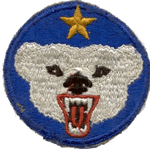World War II in the Aleutians - Shemya (APO 729)
January 26, 1943 to January 27, 1946
1. Recap of Army Facilities
Ft. Benjamine Harrison, Indiana
Ft. McClellan - Anniston, Alabama
Ft. Lawton - Seattle, Washington
4. Shemya
7. My Outfit
8. My Buddies
12. Potpourri
14. Coincidences
Most people, especially those who haven't moved around the country
often, seem to think that most of the population think and have the same
values as you do. Sort of an inbred mind-set.
It's quite a revelation, in an environment such as the Army, to discover how
different others are, in respect to politics, beliefs, use of language, moral
standards, family values, - - - you name it.
A few recollections that are still with me - - - - -
The guy who wasn"t sure whether he would return to his wife and children,
or his single sister-in-law, who he has been writing to.
The soldier who showed snapshots of trees and tried to convince others of
the "divine" faces hidden among the branches and leaves. Eventually, our
C.O. on Shemya, when the soldier demanded that his religion be recognized,
pointed to a tiny shed and said- - - - this is your new church!
The young lad from
others that Roosevelt's real name was changed from Rosenfeld, as part of
some Jewish conspiracy.
The fellow who described his pre-war vocation. He worked four minute
intervals, a total of 12 minutes a day. This took place in a facility that
produced powdered milk in vast rotating vats. For each of the four segments,
he donned a new white outfit, tied a rope around his waist (so that he could
be rescued quickly) since the vat could not be stopped for too long. The
temperature was horrific while he scraped the residue from the sides, top,
and botton, then exited before the possibility of passing out.
An alcoholic who would offer his monthly pay for a fifth of whiskey. We found
it prudent to hide hair tonic or anything containing alcohol, and tried not to be
around when he drank and became violent. When sober, he was an apologic
pussy cat. He left his home town with another draftee who ended up in the same
unit. Before they left, his wife implored his buddie to please watch over him.
The character who was obviously born at the race track. Talked from the side
of his mouth - in a low secretive voice - not wanting others to know about
the winning mount- but never looked you in the eye.
The Master Sergeant, with more stripes than a zebra, when addressing the
men, "you people". He was in the Army about 25 years, hated draftees,
especially the boys from
every order instead of being submissive. They often paid for it
Previously, I mentioned "friendly fire". My take on it is that there were many
more deaths for that reason, in this and previous wars, than we can imagine.
In the battle area, when a unit commander, the one who informs the family,
has a choice to say to the mother or wife;
"a nervous buddie of your boy saw some movement, then shot him by mistake"
OR "In the field of battle, this brave and patriotic boy served his country
with the ultimate sacrifice".
You know which one he will use!
Ft. Mc Clellan -
This training camp was named after General George B. Mc
Clellan of the
Army. He rated second
in his graduating class at
The General enjoyed the reputation of being an excellent trainer of soldiers.
When major battles began in the Civil War however, he proved to be too timid
and failed to press his advantage over Confederate troops.
you're not doing anything with your army at present, we can use it to greater
advantage elsewhere".
In the battle on the
occured later in the South Pacific. One must understand the Asian mind to
believe and comprehend this. The thousands of Japanese fought bravely,
in the handful of battles - - - but, in those battles where it was obvious that
they were going to lose, rather than lose face with the Emporer, they committed
suicide en masse by holding hand grenades to their chests. Because of this, of the
thousands of Japanese, we only captured 28 alive.
 |
 |
 |
 |
Although, in the American Army, there may have been a few suicides, the most
famous suicide bomber, a 4-engine bomber pilot, Colin Kelly, ordered his men
to parachute out, and crashed the bomber into a Japanese warship. Songs have
been written about this act of courage and sacrifice.
 A Japanese Shrine - Either Kiska or Attu |
At the time in the 40's, when the Japanese occupied
some of the |
|
The first generation American Latino with a hugh chip on his shoulders, perhaps justifyably. "They
hated me in Army". I'm not sure this was completely true, but we had millions of Japanese and millions of Germans who hated him, as well as the rest of us. |
 |
